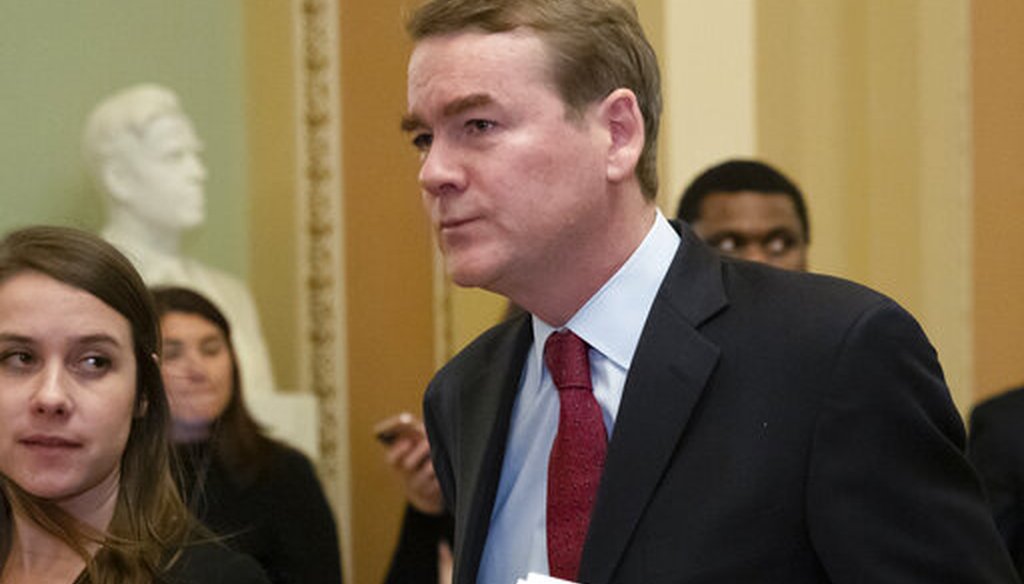Get PolitiFact in your inbox.

Sen. Michael Bennet, D-Colo., leaves the chamber after an emotional speech on the Senate floor over the partial government shutdown, at the Capitol in Washington, Thursday, Jan. 24, 2019. (AP Photo/J. Scott Applewhite)
When it became Sen. Michael Bennet's turn to speak on the Senate floor about the record-long government shutdown, the Colorado Democrat said he had had enough of criticism from Republican Sen. Ted Cruz.
Cruz had blamed Democrats for not supporting a proposal to pay the Coast Guard, the only military branch going without pay during the shutdown. In an uncharacteristic rebuttal, Bennet chastised Cruz for his role in a previous government shutdown under President Barack Obama, at a time when Bennet said his state was flooded and people were killed.
"I seldom, as you know, rise on this floor to contradict somebody on the other side," Bennet said Jan. 24. "I have worked very hard over the years to work in a bipartisan way with the presiding officer, with my Republican colleagues. But these crocodile tears that the senator from Texas is crying for first responders are too hard for me to take."
(President Donald Trump and Democratic congressional leaders on Jan. 25 said they reached a deal to reopen the government for three weeks until February 15.)
Bennet made several pointed claims about Cruz and his voting record, the deficit, China’s accomplishments in space, and the dim view most Americans have of Congress.
Here's a fact-checked recap of Bennet's claims.
"Because of (Ted Cruz), this government was shut down, for politics."
People on both sides of the aisle share the opinion that back in 2013, Cruz was the driving force behind a government shutdown.
Back then, Cruz pushed for language to defund the Affordable Care Act in spending bills, which would have forced then-President Barack Obama to choose between keeping the government open or defunding the landmark healthcare law.
Obama and Democrats refused to gut the law. Republicans, then the minority party in the Senate, didn’t have the numbers to force their will. That shutdown lasted 16 days.
Famously, Cruz spoke about defunding Obamacare on the Senate floor during a 21-hour speech in which he read "Green Eggs and Ham" as a bedtime story for his children. Even some of his fellow Republicans faulted Cruz for the shutdown and criticized his strategy.
NPR in October 2013 quoted Republican Rep. Devin Nunes of California, as saying: "We're this far, so you have to let it play out. I mean, we've already shut the government down ... and now you have to, I think, keep up with this Ted Cruz lemming strategy. It's got to move forward."
Cruz in 2018 claimed he has "consistently opposed shutdowns." We rated that Pants on Fire.
— Miriam Valverde
"I can assure you that in Colorado if a president said he was going to use eminent domain to erect a barrier across the state of Colorado, across the Rocky Mountains of Colorado, (that) he was going to steal the property of our farmers and ranchers to build his medieval wall, there wouldn’t be an elected leader from our state who would support that idea."
Trump has suggested using eminent domain to build a border wall with Mexico, but that is a legal process. Calling it "stealing" is an exaggeration. Eminent domain refers to a government’s authority to take private property for public use, with just compensation. The practice is controversial because it can be done against the will of the property owner..
Trump has said that eminent domain is something "you don’t want to use" but needs to be done in order to carry out construction projects.
"What we’re doing with eminent domain is, in many cases, we make a deal upfront, and we’ve already done that. The secretary has done a lot of that," Trump said Jan. 4. "And if we can’t make a deal, we take the land and we pay them through a court process which goes actually fairly quickly. And we’re generous. But we take the land. Otherwise you could never build anything.
"If you didn’t use eminent domain you wouldn’t have one highway in this country. You have to use eminent domain. It’s actually something you don't want to use it, but if you are going to do a stretch, as an example a pipeline and other things, you have to use eminent domain, otherwise you’d never be able to buy the land."
— Miriam Valverde
"In 2013, (Ted Cruz) didn’t support (a border security bill). I did. In 2013, we passed a bill here in a bipartisan way. It got 68 votes. It had $46 billion in border security."
This is true.
Backed by Democrats and 14 Republicans, the Border Security, Economic Opportunity, and Immigration Modernization Act passed the Senate on a 68-32 vote in June 2013. Bennet voted in favor of the bill, Cruz voted against it. (The Republican-controlled House did not take up the bill.)
That bill included more than $46 billion for border security. The vast majority of that money, $30 billion, was for the hiring and deployment of more U.S. Border Patrol agents along the southern border. The bill said at least $7.5 billion should be used to repair or replace border fencing. It also set money for infrastructure, technology and other border security projects.
— Miriam Valverde
"Forty percent of the people in this country that are undocumented are here because they came legally and overstayed."
This is generally accurate when referring to the undocumented population that has been here for many years.
The Center for Migration Studies, a nonpartisan think tank, reported in 2017 that the estimated visa overstays in 2014 accounted for 42 percent of the total undocumented population, or about 4.5 million people. That number hasn’t changed much from year to year because the undocumented population has been here for awhile, said Robert Warren, co-author of the report.
However, the figure is even higher if we look at recent arrivals.
In a more recent report, the center found that for the past seven years, the undocumented population primarily entered the United States by air and overstayed temporary visas.
Of the estimated 515,000 arrivals in 2016, 62 percent were overstays and another 38 percent entered without inspection.
The number coming across the border illegally has dropped dramatically since 2000, Warren said. This undercuts the argument that a border wall will lead to a smaller population of people in the country unlawfully.
— Amy Sherman
"Now we are here with the government shutdown over his broken promise, while the Chinese are landing spacecraft on the dark side of the moon."
This is accurate. The Chinese landed the Chang'e-4 lunar explorer on the far side of the moon, a first for any nation, on Jan. 3, 2019. The lander and rover will take photos and probe the structure and mineral composition of the terrain.
Contrary to the popular phrase, the far side of the moon is not actually dark. It’s just not visible from Earth.
Laura Grego, senior scientist at the Union of Concerned Scientists’ Global Security Program, said the United States has prioritized other areas of planetary exploration.
The United States remains ahead in overall space exploration, said Jonathan McDowell, an astrophysicist at the Harvard-Smithsonian Center for Astrophysics. But China’s rapid progress is impressive.
"I think this is an important moment in the maturity of the Chinese space program and it comes at a time when there were more Chinese space launches last year than U.S. ones, for the first time," McDowell said.
— Manuela Tobias
"Do you think the Russians don’t know that for the first time since John Glenn was sent up to orbit this planet, America cannot put a person into space without asking the Russians to do it?"
This space claim is also accurate. The United States has not had a human spaceflight vehicle since the space shuttle retired in 2011. Instead, NASA astronauts ride to the International Space Station aboard the Russian Soyuz.
"Rather than build a new government-owned human spaceflight vehicle for ISS transportation, NASA outsourced the capability to the private sector. SpaceX and Boeing are both building crew capsules and are currently expected to conduct crewed test flights this year," said Jason Davis, editor of The Planetary Society.
Until SpaceX’s Crew Dragon and Boeing's Starliner launch astronauts into orbit, the United States remains dependent on Russia.
— Manuela Tobias
"For the first time almost in history — it happened once before during the Vietnam War — we are actually having our deficit shooting through the roof while unemployment has fallen."
At best, this statement leaves out a lot of caveats and at worst, its tally of years is significantly short.
Bennet’s office said he was thinking only of the post-World War II years and relied on a CNBC article that said, "the only times since World War II that the deficit has risen while unemployment has fallen occurred during the Korean and Vietnam wars."
On that basis, Bennet exaggerated the rarity of the trend by only mentioning the Vietnam War, and not the Korean War.
Also, Bennet’s spokeswoman Courtney Gidner said he was speaking of broad trends, not actual year-to-year comparisons.
Unemployment has been falling since 2011, and until 2016, deficits were falling too. Now, deficits have begun to climb.
But when you look at actual year-to-year changes, there are more examples of years when deficits have increased as unemployment drops.
We found that deficits rose and unemployment fell in 1950, 1953, 1955, 1959, 1962, 1964, 1966, 1968, 1976, 1983, 1985 and 2004. (The same pattern held in 2016-18 but Bennet’s whole point was that the Trump years were different from the past.)
Eliminating all the war years leaves six years when deficits rose and unemployment fell.
Economists note that deficit spending generally boosts the economy in the short run, which lowers unemployment.
"No economist is surprised if a budget deficit continues to worsen in the years immediately after the unemployment rate starts to decline," said Gary Burtless, an economist with the Brookings Institution.
But in a nod to Bennet’s larger point, Burtless added, "It is somewhat surprising when the United States continues to have large deficits (as a percentage of GDP) and the deficits are worsening relatively quickly, even though the economy has been expanding for a long time."
— Jon Greenberg
"More people wanted America to be a Communist country — 11 percent — than approved of this country; and Fidel Castro had a 5 percent approval rating, which was lower than our 9 percent approval rating. He was the only one who had a lower rating than that."
Claims about the unpopularity of Congress -- for example, saying that hemorrhoids and herpes are more popular -- are common. But what Bennet omits is that while polls have often found Congress is unpopular, the vast majority of incumbents get re-elected.
Karlyn Bowman, a polling expert at the conservative American Enterprise Institute, said these comparisons of polls asking about Congress and Castro doesn’t work.
"Yes, Congress (an institution) has a low approval rating, and as you correctly say, it has dipped occasionally below 10 percent. Communism (an ideology) is simply very different, as is Castro," she said. "People take findings from different polls and equate them all the time. I’ve heard politicians say many times something to the effect that ‘congress is less popular than XYZ.’ That doesn’t mean it is a good comparison. It isn’t something I would do."
A Rasmussen Reports national survey in 2011 found 11 percent of likely U.S. voters thought communism was morally superior to the U.S. system of politics and economic.
PollingReport.com, which compiles various polls including on approval of Congress, showed 9 percent approval in a couple of polls in the fall of 2011. However, in 2018 and so far in 2019, approval has been somewhat higher: between 12 and 23 percent.
Castro’s favorability was often in the single digits in polls of U.S. Voters. Gallup found his favorability rating was 5 percent in 2008. When Castro died in 2016, Rasmussen Reports found his favorability was 10 percent.
Janine Parry, professor and director of the Arkansas Poll, said that comparing the findings of different polls is problematic, but sometimes hard to resist for someone looking for a little rhetorical flourish.
"The dissonance between congressional approval and congressional reelection rates is a longstanding one," she said. "We also love our local schools but think public education in America is a flop."
— Amy Sherman
Our Sources
Washington Post, For Ted Cruz, the 2013 shutdown was a defining moment, Feb. 16, 2016
NPR, Why Ted Cruz Looms Large In Government Shutdown Drama, Oct. 2, 2013
PolitiFact Virginia, Cruz says 40 percent of illegal immigrants have overstayed visas, Dec. 28, 2015
PolitiFact, Did Senate pass immigration bills in 2006, 2013 and House failed to vote on them?, Jan. 26, 2018
PolitiFact, Ted Cruz says he's opposed shutdowns, but he hasn't always, Jan. 22, 2018
C-SPAN, President Trump on Eminent Domain and the Border Wall, Jan. 4, 2019
Congress.gov, S.744 - Border Security, Economic Opportunity, and Immigration Modernization Act
NBC News, China lands spacecraft on 'dark' side of moon in world first, Jan. 3, 2019
PolitiFact, MOSTLY TRUE: Visa overstays account for ‘half’ of all people in the country illegally,"Aug. 2, 2018
Rasmussen Reports, U.S. Voters Still View Fidel Castro Unfavorably, Nov. 28, 2016
Rasmussen Reports, 11% Say Communism Better Than U.S. System of Politics and Economics, March 15, 2011
Gallup, Favorability people in the news, 2008
Sen. Michael Bennet, Floor speech, November 2011
PollingReport.com, Congressional approval, January 2019
PolitiFact, Is Congress really less popular than hemorrhoids and herpes as Arnold Schwarzenegger claims? April 14, 2017
PolitiFact, Congress has 11% approval ratings but 96% incumbent reelection rate, meme says, Nov. 11, 2014
Center for Migration Studies, The 2,000 mile wall in search of a purpose, 2017
Center for Migration Studies, US Undocumented Population Continued to Fall from 2016 to 2017, and Visa Overstays Significantly Exceeded Illegal Crossings for the Seventh Consecutive Year, Jan. 16, 2019
Congressional Budget Office, Options for Reducing the Deficit: 2019 to 2028, Dec. 13, 2018
Usgovernmentspending.com, Historic deficit: 1792-2018, accessed Jan. 25, 2019
Bureau of Labor Statistics, Labor Force, Employment, and Unemployment, 1929-39: Estimating Methods, 1948
Bureau of Labor Statistics, Unemployment, accessed Jan. 25, 2019
Office of Management and Budget, Historical Tables, accessed Jan. 25, 2019
The Balance, Unemployment Rate by Year Since 1929 Compared to Inflation and GDP, Jan. 21, 2019
New York Times, Americans’ Approval of Congress Drops to Single Digits, Oct. 25, 2011
U.S. Department of Homeland Security, Visa overstay report, 2018
Email interview with Jonathan McDowell, astrophysicist at the Harvard-Smithsonian Center for Astrophysics, Jan. 25, 2019
Phone interview with Laura Grego, senior scientist at the Union of Concerned Scientists’ Global Security Program
Email interview with Joan Johnson-Freese, professor of national security at the Naval War College, Jan. 25, 2019
Email interview with Jason Davis, editor of The Planetary Society, Jan. 25, 2019
Email interview with Joshua Colwell, professor of planetary science and assistant director of the Florida Space Institute, University of Central Florida, Jan. 25, 2019
Email interview with Janine A. Parry, political science professor at the University of Arkansas and director of the Arkansas Poll, Jan. 25, 2019
Email interview with Karlyn Bowman, polling expert at the American Enterprise Institute, Jan. 25, 2019
Email interview with Robert Warren, Center for Migration Studies senior visiting fellow, Jan. 25, 2019
Email interview with Courtney Gidner, U.S. Sen. Michael Bennet spokeswoman, Jan. 25, 2019
Email interview, Gary Burtless, economist and senior fellow, Brookings Institution, Jan. 25, 2019
Email interview, Alan Auerbach, professor of economics, University of California-Berkeley, Jan. 25, 2019





 PolitiFact Rating:
PolitiFact Rating: 
 PolitiFact Rating:
PolitiFact Rating: 
 PolitiFact Rating:
PolitiFact Rating: 






















































